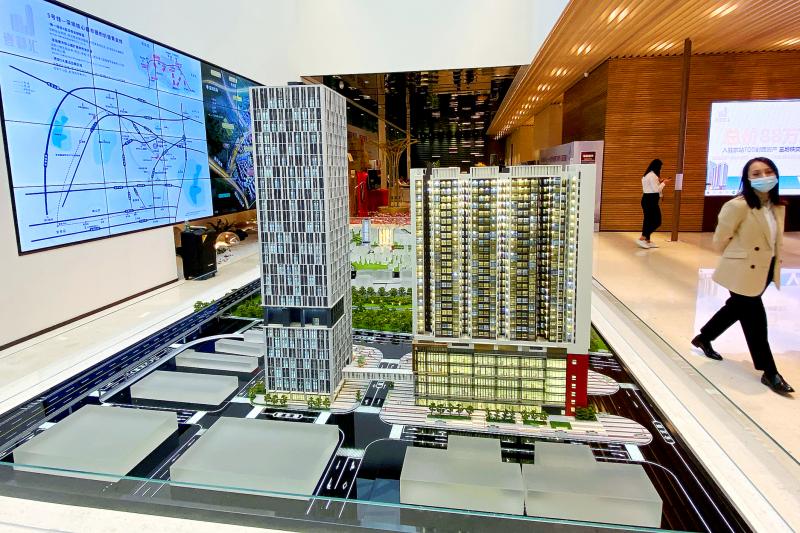The People’s Bank of China (PBOC) said it would guard against moral hazards such as greenwashing and sustainable project fraud as it expands its use of green monetary policy to drive the nation’s energy transition.
In a rare interview conducted in English with a state broadcaster, PBOC Governor Yi Gang (易綱) warned against the “greenwashing, low-cost fund arbitrage and green project fraud” that have been on the rise alongside the influx of sustainable capital in recent years.
“For fair and efficient implementation of green monetary policy tools, we should guard against different kinds of moral hazards,” Yi said. “Therefore, information disclosure and strict supervision are needed when we design and implement” these tools.

Photo: Reuters
A transcript of his interview with China Global Television Network was released on Monday by the central bank in English and Mandarin, a sign his comments were targeted toward an international audience.
As the world’s worst polluter, China has quickly pushed a chart-topping amount of private money to meet its green targets, which include peak emissions by 2030 and carbon neutrality by 2060. In just a few years, it has become one of the biggest issuers of green bonds, green loans and other financial products designed to support those policy goals.
The PBOC has wielded its green monetary tools to contribute to that push. Since November, it has lent about 210 billion yuan (US$31.4 billion) to banks at cheaper rates to help them provide more loans to firms working toward China’s carbon-reduction goals.
Meanwhile, Chinese borrowers have sold about US$56.4 billion in local and offshore environmental, social and governance, or ESG, debt this year, making it one of the fastest-growing green bond markets in the world. New green bonds in China almost doubled in the first quarter, even as the rest of the world saw a 32 percent decline.
Still, the risks of poor oversight and access to cheap credit are fresh in regulators’ minds, with the debt crisis engulfing China’s real-estate sector continuing to play out. Allowing riskier borrowers unfettered access to cheaper green debt has already resulted in defaults. Late last year, Modern Land China Co (當代置業) failed to repay a green dollar bond and Kaisa Group Holdings Ltd (佳兆業集團) skipped payment on a sustainability bond.
The PBOC will continue promoting disclosure and “strict supervision,” Yi said.
Last year, the central bank released guidelines on environmental reporting for financial institutions, including on green loan issuance. It has been piloting the program in the Greater Bay Area along with Guizhou and Chongqing in southwestern China.
The program will be expanded nationwide, Yi said.
“This year, our priority is to develop the framework for transition finance, to guide social capital to support low-carbon transition of high-emission sectors,” he said.

SEMICONDUCTORS: The German laser and plasma generator company will expand its local services as its specialized offerings support Taiwan’s semiconductor industries Trumpf SE + Co KG, a global leader in supplying laser technology and plasma generators used in chip production, is expanding its investments in Taiwan in an effort to deeply integrate into the global semiconductor supply chain in the pursuit of growth. The company, headquartered in Ditzingen, Germany, has invested significantly in a newly inaugurated regional technical center for plasma generators in Taoyuan, its latest expansion in Taiwan after being engaged in various industries for more than 25 years. The center, the first of its kind Trumpf built outside Germany, aims to serve customers from Taiwan, Japan, Southeast Asia and South Korea,

Gasoline and diesel prices at domestic fuel stations are to fall NT$0.2 per liter this week, down for a second consecutive week, CPC Corp, Taiwan (台灣中油) and Formosa Petrochemical Corp (台塑石化) announced yesterday. Effective today, gasoline prices at CPC and Formosa stations are to drop to NT$26.4, NT$27.9 and NT$29.9 per liter for 92, 95 and 98-octane unleaded gasoline respectively, the companies said in separate statements. The price of premium diesel is to fall to NT$24.8 per liter at CPC stations and NT$24.6 at Formosa pumps, they said. The price adjustments came even as international crude oil prices rose last week, as traders

Taiwan Semiconductor Manufacturing Co (TSMC, 台積電), which supplies advanced chips to Nvidia Corp and Apple Inc, yesterday reported NT$1.046 trillion (US$33.1 billion) in revenue for last quarter, driven by constantly strong demand for artificial intelligence (AI) chips, falling in the upper end of its forecast. Based on TSMC’s financial guidance, revenue would expand about 22 percent sequentially to the range from US$32.2 billion to US$33.4 billion during the final quarter of 2024, it told investors in October last year. Last year in total, revenue jumped 31.61 percent to NT$3.81 trillion, compared with NT$2.89 trillion generated in the year before, according to

PRECEDENTED TIMES: In news that surely does not shock, AI and tech exports drove a banner for exports last year as Taiwan’s economic growth experienced a flood tide Taiwan’s exports delivered a blockbuster finish to last year with last month’s shipments rising at the second-highest pace on record as demand for artificial intelligence (AI) hardware and advanced computing remained strong, the Ministry of Finance said yesterday. Exports surged 43.4 percent from a year earlier to US$62.48 billion last month, extending growth to 26 consecutive months. Imports climbed 14.9 percent to US$43.04 billion, the second-highest monthly level historically, resulting in a trade surplus of US$19.43 billion — more than double that of the year before. Department of Statistics Director-General Beatrice Tsai (蔡美娜) described the performance as “surprisingly outstanding,” forecasting export growth